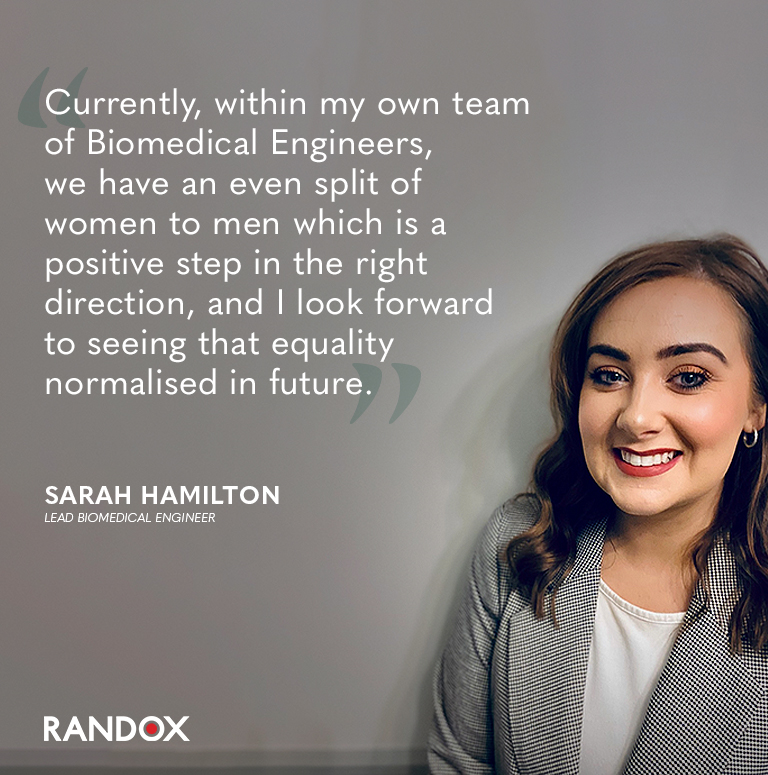International Day of Women and Girls in Science!


International Day of Women and Girls in Science!
On Saturday 11th February, we are celebrating International day of Women and girls in Science! This day is an opportunity to celebrate and promote equal access to science for women and girls.
Ahead of the 11th, we have interviewed five influential Women who fulfil STEM based roles across Randox Laboratories. They have shared their experiences and thoughts on Women and girls in the science industry.
Our second interview is with Lead Biomedical Engineer- Sarah Hamilton.

Why did you pursue a career in STEM?
At A-Level I studied Technology & Design, Biology & Chemistry. I always enjoyed the process of facing a problem scenario and working through design processes to form a solution. The problems I identified were always centred around healthcare issues. During A-Levels, I also had the opportunity to take part in the Sentinus Golden Crest Award, an initiative promoting STEM in schools. I went on to pursue a career in Engineering largely down to the great exposure I had to the industry during my time at school. Biomedical Engineering appealed to me most as it had the added aspects of applying biological/biochemical principles to technology in ways that improve healthcare provision and create products that directly impact quality of life. As part of my degree, I had an Industrial placement year, this experience was within Medical Device R&D where I had some amazing mentors who helped me see that Engineering R&D was definitely the correct career path for me.
What is your role in Randox and how long have you worked in the company for?
My role within Randox is Lead Biomedical Engineer within the Engineering R&D department. I started in 2017 having graduated from Ulster University as a Biomedical Engineer. During the last 6 years I have progressed to a Team Leader role. In this role I co-ordinate a team of 7 people from Senior to Placement Biomedical Engineers.
Within this team we work across multiple projects which are all in different stages of development. My main role is to plan and facilitate the completion of testing ranging from early prototype development through to Verification & Validation. The Biomedical Engineering role involves working within a multidisciplinary team of Mechanical, Electrical & Embedded Design Engineers, Software Developers & Testers and Scientists (Chemists & Physicists). In Engineering, we also work alongside Assay Development Scientists and Lab Scientists. In doing so we ensure our product requirements are in line with user needs and performance is as expected.
What change have you seen for women in science over the years?
Comparing my time at school & university to now, there has been a noticeable change in the emphasis put on STEM careers. It is great to see employers from a variety of industries participating in more outreach programmes aimed at both primary, secondary and tertiary education levels, similar to the Sentinus Award which first got me interested in a STEM career. Many of my colleagues, and I, have participated in different events aimed at promoting careers in STEM. And I know many companies have diversity and inclusion programmes with aims of attracting more females into STEM roles at both junior and more senior levels. I feel that this has helped change attitudes of both woman and men from what was previously considered normal within STEM.
Have you found it harder or any different going into your career in science as a woman?
When I started as a graduate engineer, I was the only female in a team of 15 men, so, while I have found the industry still quite predominately male, I don’t believe this poses any setbacks for starting out in a STEM career or for career progression. Currently, within my own team of Biomedical Engineers, we have an even split of woman to men which is a positive step in the right direction, and I look forward to seeing that equality normalised in future. Overall, getting to work within a group of likeminded people who work together to solve multiple complex problems is extremely rewarding.
How do you think we can encourage more women to go into the science industry?
I think improving and promoting initiatives that provide exposure/insight into the STEM industry in schools is one of the best ways to inspire the next generation. It allows more girls to see the many different roles in the STEM industry which they might not otherwise have been aware of or considered pursuing.
If you have one piece of advice as a woman starting out the STEM industry, what would it be?
Have confidence to make sure you are heard.
For more information, please contact Market@randox.com
